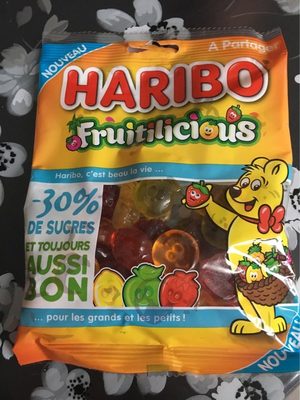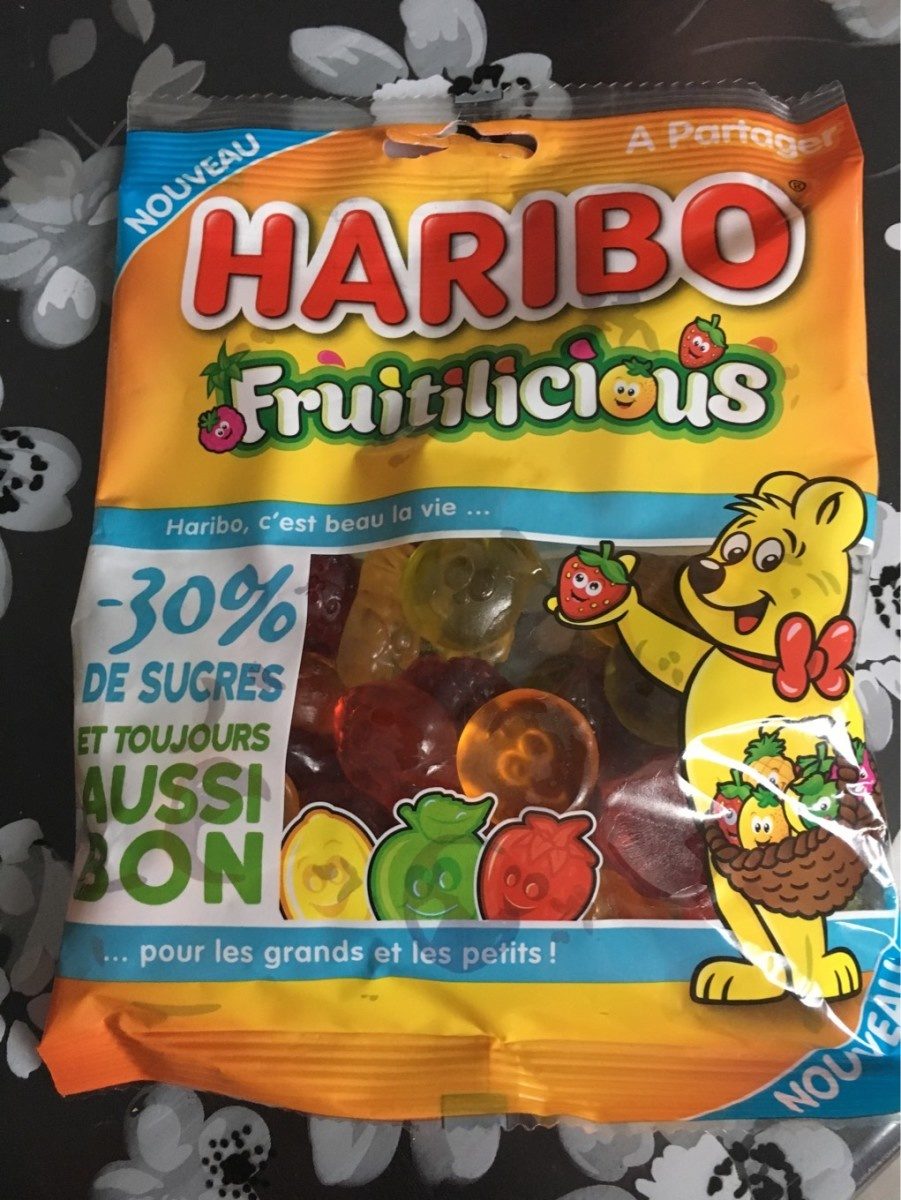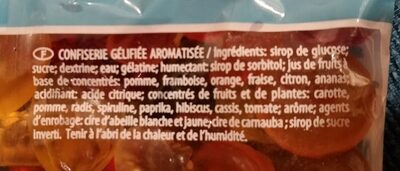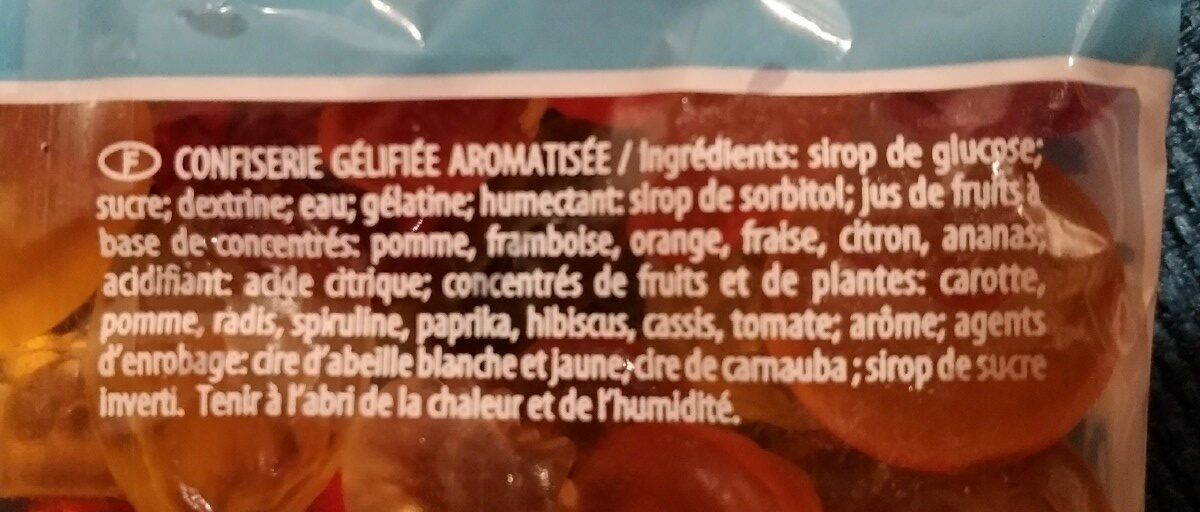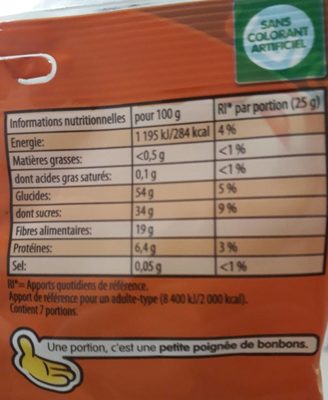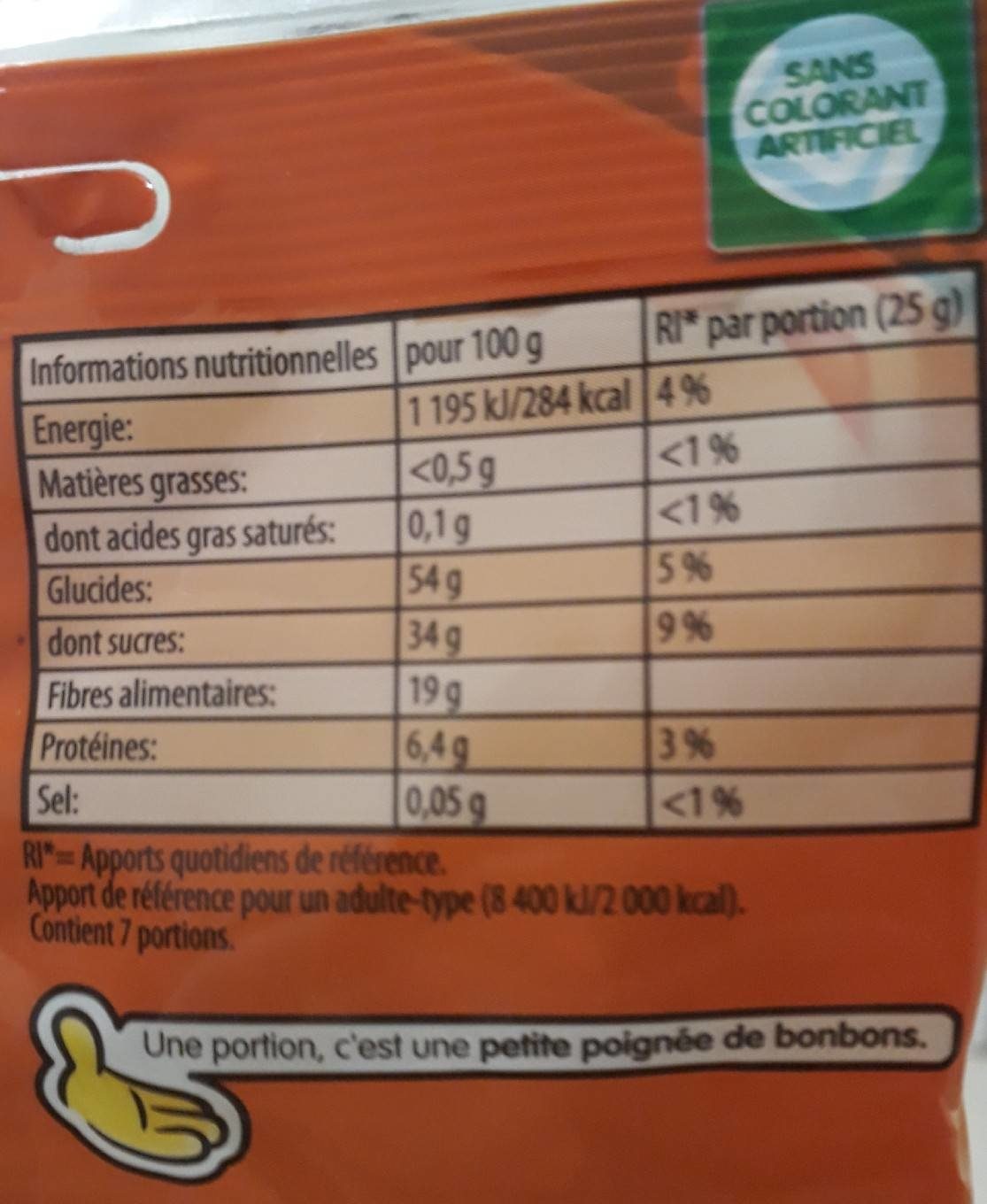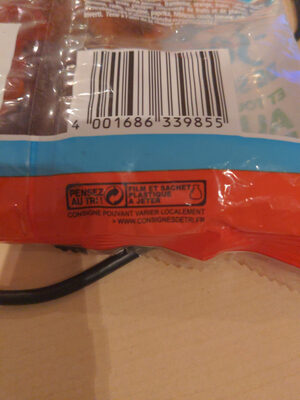Help us make food transparency the norm!
As a non-profit organization, we depend on your donations to continue informing consumers around the world about what they eat.
The food revolution starts with you!
Fruitlicious - haribo - 175 g
Fruitlicious - haribo - 175 g
This product page is not complete. You can help to complete it by editing it and adding more data from the photos we have, or by taking more photos using the app for Android or iPhone/iPad. Thank you!
×
Barcode: 4001686339855 (EAN / EAN-13)
Quantity: 175 g
Packaging: Plastic, Bag, fr:Film en plastique, fr:Sachet en plastique
Brands: Haribo
Categories: Snacks, Sweet snacks, Confectioneries, Candies
Labels, certifications, awards: Low or no sugar, Low sugar, Reduced sugar, 30% less sugar, No artificial colors, No colorings
Stores: Carrefour, Magasins U
Countries where sold: France
Matching with your preferences
Health
Ingredients
-
30 ingredients
: Sirop de glucose; sucre; dextrine; eau; gélatine; humectant: sirop de sorbitol; jus de fruits à base de concentrés: pomme, framboise,orange, fraise, citron, ananas; acidifiant: acide citrique; concentrés de fruits et de plantes: carotte, pomme, radis, spiruline, paprika, hibiscus, cassis, tomate; arôme; agents d'enrobage: cire d'abeille blanche et jaune, cire de carnauba ; sirop de sucre inverti.Allergens: Orange
Food processing
-
Ultra processed foods
Elements that indicate the product is in the 4 - Ultra processed food and drink products group:
- Additive: E1400 - Dextrin
- Additive: E420 - Sorbitol
- Additive: E428 - Gelatine
- Additive: E901 - White and yellow beeswax
- Additive: E903 - Carnauba wax
- Ingredient: Flavouring
- Ingredient: Glazing agent
- Ingredient: Glucose
- Ingredient: Glucose syrup
- Ingredient: Humectant
- Ingredient: Invert sugar
- Ingredient: Fruit juice concentrate
Food products are classified into 4 groups according to their degree of processing:
- Unprocessed or minimally processed foods
- Processed culinary ingredients
- Processed foods
- Ultra processed foods
The determination of the group is based on the category of the product and on the ingredients it contains.
Additives
-
E1400 - Dextrin
Dextrin: Dextrins are a group of low-molecular-weight carbohydrates produced by the hydrolysis of starch or glycogen. Dextrins are mixtures of polymers of D-glucose units linked by α--1→4- or α--1→6- glycosidic bonds. Dextrins can be produced from starch using enzymes like amylases, as during digestion in the human body and during malting and mashing, or by applying dry heat under acidic conditions -pyrolysis or roasting-. The latter process is used industrially, and also occurs on the surface of bread during the baking process, contributing to flavor, color and crispness. Dextrins produced by heat are also known as pyrodextrins. The starch hydrolyses during roasting under acidic conditions, and short-chained starch parts partially rebranch with α--1‚6- bonds to the degraded starch molecule. See also Maillard Reaction. Dextrins are white, yellow, or brown powders that are partially or fully water-soluble, yielding optically active solutions of low viscosity. Most of them can be detected with iodine solution, giving a red coloration; one distinguishes erythrodextrin -dextrin that colours red- and achrodextrin -giving no colour-. White and yellow dextrins from starch roasted with little or no acid are called British gum.Source: Wikipedia
-
E330 - Citric acid
Citric acid is a natural organic acid found in citrus fruits such as lemons, oranges, and limes.
It is widely used in the food industry as a flavor enhancer, acidulant, and preservative due to its tart and refreshing taste.
Citric acid is safe for consumption when used in moderation and is considered a generally recognized as safe (GRAS) food additive by regulatory agencies worldwide.
-
E420 - Sorbitol
Sorbitol: Sorbitol --, less commonly known as glucitol --, is a sugar alcohol with a sweet taste which the human body metabolizes slowly. It can be obtained by reduction of glucose, which changes the aldehyde group to a hydroxyl group. Most sorbitol is made from corn syrup, but it is also found in nature, for example in apples, pears, peaches, and prunes. It is converted to fructose by sorbitol-6-phosphate 2-dehydrogenase. Sorbitol is an isomer of mannitol, another sugar alcohol; the two differ only in the orientation of the hydroxyl group on carbon 2. While similar, the two sugar alcohols have very different sources in nature, melting points, and uses.Source: Wikipedia
-
E420ii - Sorbitol syrup
Sorbitol: Sorbitol --, less commonly known as glucitol --, is a sugar alcohol with a sweet taste which the human body metabolizes slowly. It can be obtained by reduction of glucose, which changes the aldehyde group to a hydroxyl group. Most sorbitol is made from corn syrup, but it is also found in nature, for example in apples, pears, peaches, and prunes. It is converted to fructose by sorbitol-6-phosphate 2-dehydrogenase. Sorbitol is an isomer of mannitol, another sugar alcohol; the two differ only in the orientation of the hydroxyl group on carbon 2. While similar, the two sugar alcohols have very different sources in nature, melting points, and uses.Source: Wikipedia
-
E901 - White and yellow beeswax
Beeswax: Beeswax -cera alba- is a natural wax produced by honey bees of the genus Apis. The wax is formed into "scales" by eight wax-producing glands in the abdominal segments of worker bees, which discard it in or at the hive. The hive workers collect and use it to form cells for honey storage and larval and pupal protection within the beehive. Chemically, beeswax consists mainly of esters of fatty acids and various long-chain alcohols. Beeswax has long-standing applications in human food and flavoring. For example, it is used as a glazing agent or as a light/heat source. It is edible, in the sense of having similar negligible toxicity to plant waxes, and is approved for food use in most countries and the European Union under the E number E901. However, the wax monoesters in beeswax are poorly hydrolysed in the guts of humans and other mammals, so they have insignificant nutritional value. Some birds, such as honeyguides, can digest beeswax. Beeswax is the main diet of wax moth larvae.Source: Wikipedia
-
E903 - Carnauba wax
Carnauba wax: Carnauba -; Portuguese: carnaúba [kaʁnɐˈubɐ]-, also called Brazil wax and palm wax, is a wax of the leaves of the palm Copernicia prunifera -Synonym: Copernicia cerifera-, a plant native to and grown only in the northeastern Brazilian states of Piauí, Ceará, Maranhão, Bahia, and Rio Grande do Norte. It is known as "queen of waxes" and in its pure state, usually comes in the form of hard yellow-brown flakes. It is obtained from the leaves of the carnauba palm by collecting and drying them, beating them to loosen the wax, then refining and bleaching the wax.Source: Wikipedia
Ingredients analysis
-
Palm oil free
No ingredients containing palm oil detected
-
Non-vegan
Non-vegan ingredients: E428, E901
-
Non-vegetarian
Non-vegetarian ingredients: E428
-
Details of the analysis of the ingredients
: Sirop de glucose, sucre, dextrine, eau, gélatine, humectant (sirop de sorbitol), jus de fruits à base de concentrés (pomme), framboise, orange, fraise, citron, ananas, acidifiant (acide citrique), concentrés de fruits et (carotte), pomme, radis, spiruline, paprika, hibiscus, cassis, tomate, arôme, agents d'enrobage (cire d'abeille blanche et jaune), cire de carnauba, sirop de sucre inverti- Sirop de glucose -> en:glucose-syrup - vegan: yes - vegetarian: yes - ciqual_proxy_food_code: 31016 - percent_min: 4 - percent_max: 100
- sucre -> en:sugar - vegan: yes - vegetarian: yes - ciqual_proxy_food_code: 31016 - percent_min: 0 - percent_max: 34
- dextrine -> en:e1400 - vegan: yes - vegetarian: yes - percent_min: 0 - percent_max: 33.3333333333333
- eau -> en:water - vegan: yes - vegetarian: yes - ciqual_food_code: 18066 - percent_min: 0 - percent_max: 25
- gélatine -> en:e428 - vegan: no - vegetarian: no - percent_min: 0 - percent_max: 20
- humectant -> en:humectant - percent_min: 0 - percent_max: 16.6666666666667
- sirop de sorbitol -> en:e420ii - vegan: yes - vegetarian: yes - percent_min: 0 - percent_max: 16.6666666666667
- jus de fruits à base de concentrés -> en:fruit-juice-from-concentrate - percent_min: 0 - percent_max: 14.2857142857143
- pomme -> en:apple - vegan: yes - vegetarian: yes - ciqual_food_code: 13050 - percent_min: 0 - percent_max: 14.2857142857143
- framboise -> en:raspberry - vegan: yes - vegetarian: yes - ciqual_food_code: 13015 - percent_min: 0 - percent_max: 12.5
- orange -> en:orange - vegan: yes - vegetarian: yes - ciqual_proxy_food_code: 13034 - percent_min: 0 - percent_max: 11.1111111111111
- fraise -> en:strawberry - vegan: yes - vegetarian: yes - ciqual_food_code: 13014 - percent_min: 0 - percent_max: 10
- citron -> en:lemon - vegan: yes - vegetarian: yes - ciqual_proxy_food_code: 13009 - percent_min: 0 - percent_max: 9.09090909090909
- ananas -> en:pineapple - vegan: yes - vegetarian: yes - percent_min: 0 - percent_max: 8.33333333333333
- acidifiant -> en:acid - percent_min: 0 - percent_max: 7.69230769230769
- acide citrique -> en:e330 - vegan: yes - vegetarian: yes - percent_min: 0 - percent_max: 7.69230769230769
- concentrés de fruits et -> en:fruit-concentrate - labels: en:vegan - vegan: en:yes - vegetarian: en:yes - percent_min: 0 - percent_max: 7.14285714285714
- carotte -> en:carrot - vegan: yes - vegetarian: yes - ciqual_food_code: 20009 - percent_min: 0 - percent_max: 7.14285714285714
- pomme -> en:apple - vegan: yes - vegetarian: yes - ciqual_food_code: 13050 - percent_min: 0 - percent_max: 6.66666666666667
- radis -> en:radish - vegan: yes - vegetarian: yes - ciqual_food_code: 20045 - percent_min: 0 - percent_max: 6.25
- spiruline -> en:spirulina - vegan: yes - vegetarian: yes - ciqual_proxy_food_code: 20984 - percent_min: 0 - percent_max: 5.88235294117647
- paprika -> en:paprika - vegan: yes - vegetarian: yes - ciqual_food_code: 11049 - percent_min: 0 - percent_max: 5.55555555555556
- hibiscus -> en:roselle-flower - vegan: yes - vegetarian: yes - percent_min: 0 - percent_max: 5.26315789473684
- cassis -> en:blackcurrant - vegan: yes - vegetarian: yes - ciqual_food_code: 13007 - percent_min: 0 - percent_max: 5
- tomate -> en:tomato - vegan: yes - vegetarian: yes - ciqual_food_code: 20047 - percent_min: 0 - percent_max: 4.76190476190476
- arôme -> en:flavouring - vegan: maybe - vegetarian: maybe - percent_min: 0 - percent_max: 4.54545454545455
- agents d'enrobage -> en:glazing-agent - percent_min: 0 - percent_max: 4.34782608695652
- cire d'abeille blanche et jaune -> en:e901 - vegan: no - vegetarian: yes - percent_min: 0 - percent_max: 4.34782608695652
- cire de carnauba -> en:e903 - vegan: yes - vegetarian: yes - percent_min: 0 - percent_max: 4.16666666666667
- sirop de sucre inverti -> en:invert-sugar-syrup - vegan: yes - vegetarian: yes - percent_min: 0 - percent_max: 4
Nutrition
-
Good nutritional quality
⚠ ️Warning: the amount of fruits, vegetables and nuts is not specified on the label, it was estimated from the list of ingredients: 1This product is not considered a beverage for the calculation of the Nutri-Score.
Positive points: 8
- Proteins: 3 / 5 (value: 6.4, rounded value: 6.4)
- Fiber: 5 / 5 (value: 19, rounded value: 19)
- Fruits, vegetables, nuts, and colza/walnut/olive oils: 0 / 5 (value: 1.92159461975098, rounded value: 1.9)
Negative points: 10
- Energy: 3 / 10 (value: 1188, rounded value: 1188)
- Sugars: 7 / 10 (value: 34, rounded value: 34)
- Saturated fat: 0 / 10 (value: 0.1, rounded value: 0.1)
- Sodium: 0 / 10 (value: 20, rounded value: 20)
The points for proteins are counted because the negative points are less than 11.
Nutritional score: (10 - 8)
Nutri-Score:
-
Nutrient levels
-
Fat in low quantity (0.5%)
What you need to know- A high consumption of fat, especially saturated fats, can raise cholesterol, which increases the risk of heart diseases.
Recommendation: Limit the consumption of fat and saturated fat- Choose products with lower fat and saturated fat content.
-
Saturated fat in low quantity (0.1%)
What you need to know- A high consumption of fat, especially saturated fats, can raise cholesterol, which increases the risk of heart diseases.
Recommendation: Limit the consumption of fat and saturated fat- Choose products with lower fat and saturated fat content.
-
Sugars in high quantity (34%)
What you need to know- A high consumption of sugar can cause weight gain and tooth decay. It also augments the risk of type 2 diabetes and cardio-vascular diseases.
Recommendation: Limit the consumption of sugar and sugary drinks- Sugary drinks (such as sodas, fruit beverages, and fruit juices and nectars) should be limited as much as possible (no more than 1 glass a day).
- Choose products with lower sugar content and reduce the consumption of products with added sugars.
-
Salt in low quantity (0.05%)
What you need to know- A high consumption of salt (or sodium) can cause raised blood pressure, which can increase the risk of heart disease and stroke.
- Many people who have high blood pressure do not know it, as there are often no symptoms.
- Most people consume too much salt (on average 9 to 12 grams per day), around twice the recommended maximum level of intake.
Recommendation: Limit the consumption of salt and salted food- Reduce the quantity of salt used when cooking, and don't salt again at the table.
- Limit the consumption of salty snacks and choose products with lower salt content.
-
-
Nutrition facts
Nutrition facts As sold
for 100 g / 100 mlAs sold
per serving (100g)Compared to: Candies Energy 1,188 kj
(284 kcal)1,190 kj
(284 kcal)-19% Fat 0.5 g 0.5 g -71% Saturated fat 0.1 g 0.1 g -90% Carbohydrates 54 g 54 g -35% Sugars 34 g 34 g -39% Fiber 19 g 19 g +3,438% Proteins 6.4 g 6.4 g +209% Salt 0.05 g 0.05 g -61% Fruits‚ vegetables‚ nuts and rapeseed‚ walnut and olive oils (estimate from ingredients list analysis) 1.922 % 1.922 %
Environment
-
Eco-Score C - Moderate environmental impact
⚠ ️Select a country in order to include the full impact of transportation.The Eco-Score is an experimental score that summarizes the environmental impacts of food products.→ The Eco-Score was initially developped for France and it is being extended to other European countries. The Eco-Score formula is subject to change as it is regularly improved to make it more precise and better suited to each country.Life cycle analysis
-
Average impact of products of the same category: B (Score: 62/100)
Category: Candies, all types
Category: Candies, all types
- PEF environmental score: 0.41 (the lower the score, the lower the impact)
- including impact on climate change: 1.73 kg CO2 eq/kg of product
Stage Impact Agriculture
78.2 %Processing
10.7 %Packaging
5.5 %Transportation
4.5 %Distribution
1.1 %Consumption
0.0 %
Bonuses and maluses
-
Missing origins of ingredients information
Malus: -5
⚠ ️ The origins of the ingredients of this product are not indicated.
If they are indicated on the packaging, you can modify the product sheet and add them.
If you are the manufacturer of this product, you can send us the information with our free platform for producers.
-
Packaging with a medium impact
Malus: -11
Shape Material Recycling Impact Bag Plastic High Film Plastic High
Eco-Score for this product
-
Impact for this product: C (Score: 46/100)
Product: Fruitlicious - haribo - 175 g
Life cycle analysis score: 62
Sum of bonuses and maluses: -16
Final score: 46/100
-
Carbon footprint
-
Equal to driving 0.9 km in a petrol car
173 g CO² per 100g of product
The carbon emission figure comes from ADEME's Agribalyse database, for the category: Candies, all types (Source: ADEME Agribalyse Database)
Stage Impact Agriculture
52.3 %Processing
19.5 %Packaging
15.7 %Transportation
11.6 %Distribution
1.0 %Consumption
0.0 %
Packaging
-
Packaging with a medium impact
-
Packaging parts
Bag (Plastic)
Film (Plastic)
-
Packaging materials
Material % Packaging weight Packaging weight per 100 g of product Plastic
-
Transportation
-
Origins of ingredients
Missing origins of ingredients information
⚠ ️ The origins of the ingredients of this product are not indicated.
If they are indicated on the packaging, you can modify the product sheet and add them.
If you are the manufacturer of this product, you can send us the information with our free platform for producers.Add the origins of ingredients for this product Add the origins of ingredients for this product
Report a problem
-
Incomplete or incorrect information?
Category, labels, ingredients, allergens, nutritional information, photos etc.
If the information does not match the information on the packaging, please complete or correct it. Open Food Facts is a collaborative database, and every contribution is useful for all.
Data sources
Product added on by kiliweb
Last edit of product page on by packbot.
Product page also edited by autorotate-bot, date-limite-app, francoisparis, hungergames, magasins-u, openfoodfacts-contributors, quechoisir, roboto-app, tacite, teolemon, yuka.RjdJcE1iMDRtZHNxeXRnMCtBUHRwL1YybDYyelcyanJLTzBOSVE9PQ, yuka.SGFFWUVLNHJudFFRb3ZBUCtFS00zdEY2KzcyN2YyKzlKdnNCSVE9PQ, yuka.UWFVNkZLdGVuTkFwdGZRVDNEbmwxdDU3enBxZ1FtWHNOL0E5SVE9PQ, yuka.UmI5WVRhQUV2OVVYaGNFUjBpdjI5WTByM1o2WVJXT1pkT0VMSVE9PQ, yuka.VC9ncU9vVllnUG95bnNBazNoWE95dHRaMXBHNGNHNnJLdEVUSVE9PQ, yuka.WFBvNEtLZ2RsTlVOaDhJMDB4UFozUFpRbTd1eVdtL3JFcllRSVE9PQ, yuka.WTZNOVRJWTh1Y0VIdU1BKzNqelBxOXhRK2IrUWVFbXZNZWt4SVE9PQ, yuka.YXAwSEtMa21uS1VMdE05aDFSYjYxZWxQbUxTdGYzNm1CZFU0SVE9PQ, yuka.Zm84RkxQb05uT0l2cDhaa28wLyswZXBRM3Nlc1pIM25jK1l1SVE9PQ.
